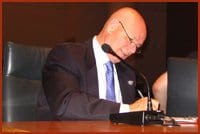After speculation in the days leading up the Mayor’s Town Hall about whether he would attend — or for how long — mayor Larry O’Brien showed up, early, to take part.
“I’m pleased to be here,” said O’Brien, noting that his other scheduling conflicts had been resolved. “I’m the mayor of all people. I’m here for as long as you need me.”
The mayor recently came under fire for not attending the city hall Pride flag-raising.
A crowd of 90 was on hand at city hall to tell the mayor and the other members of the night’s panel about queer issues. The panel included Somerset Ward councillor Diane Holmes, activist and vice-chair of the board of Capital Pride Joanne Law, and police chief Vernon White, who arrived late. Councillors Christine Leadman and Peggy Feltmate watched from the audience.
This year, the panel fielded several questions about the official recognition of the human rights of transgendered and transsexual people. The mayor admitted that he “doesn’t know a lot of the details about the issues that [transgendered people] face. I do know that the city of Ottawa is doing a tremendous amount to ensure diversity and to ensure equality of treatment.”
O’Brien also said he would not put forth a motion in council on the issue, and would leave that up to of other councillors with more knowledge of the issues.
Later, however, Shannon Blatt, a member of the Trans Human Rights Campaign, presented a petition in support of amending the Human Rights Code, asking each member of the panel to sign.
O’Brien and White then both put name to paper.
The recent cancellation of the city’s crack pipe distribution program was also a hot topic. The cancellation has been loudly protested by many who suggest that the harm reduction program was effective, and the new plan to build a 48-bed rehabilitation centre is not sufficient to battle the city’s drug problem.
“This is an issue that does affect some members of our community,” said Nathan Hauch. “What the cancellation of the crack pipe distribution program does is condemn some people to become ill over time.”
O’Brien was characteristically blunt in his response.
“Crystal meth is a fast highway to death,” O’Brien said. “They argue harm reduction, I argue murder. [The crack pipe program] will not be coming back on my watch. We will put all our efforts and all out energies into providing people with the services of rehabilitation.”
In response, Holmes touted the program’s track record in helping to reduce the amount of hepatitis C and HIV/AIDS cases.
“We certainly know it doesn’t solve the drug addiction problem, but we know it is a technique to try and reduce the amount of those killing diseases,” Holmes said.
Peter Zanette also asked the mayor whether the relationship between O’Brien’s office and the Ottawa queer community centre would continue to be strengthened after two of the mayor’s staffers, who had been taking part in meetings with the centre, left their jobs.
“I would prefer to be involved in those meetings myself, “O’Brien said. “It’s one thing for my staff to be aware of the issues, but it’s infinitely more important, with my particular management style, to learn the issues and to hear directly. This job is big, but it’s never too big to listen to the people.”
Trans activist Joanne Law says she thought the event was “awesome. The questions were for everybody, it wasn’t just one community that was talking, and it’s neat that the transgendered community is finally speaking up and being vocal and visible.”
Holmes agrees, saying that from her standpoint, the meeting had gone very well.
“I think it was an introduction of the community to the major, and the major to the community. And I think he’s quite correct, he knows nothing about this community, so I think it was a good start. There were lots of different groups in this meeting and so he’s gotten to know how many groups there are, that this is a very big community in this city, and that we need to treat all our residents with respect, and know all about them. It was a very positive meeting,” Holmes says.
The organizer and host of the event, Jeremy Dias of Jer’s Vision, is cautiously optimistic about how the event went.
“I think this was an opportunity, and I do hope this was the first of many meetings we have with the mayor. It’s a very symbolic gesture, obviously, to attend a meeting like this,” Dias says.
“There’s no commitment, there’s no guarantee, but at the same time, that symbolism means a lot, and [the mayor] is going to have to live up to that symbolism, both to our community, but also to the community at large,” Dias points out.
“His presence here leaves a strong statement, obviously with us, but maybe with more conservative members of the community who don’t support our community. That said, I think it was great to see so much community dialogue, and so excellent to see so much diversity in the crowd.”
Last year’s town hall meeting was itself the subject of speculation. Following city council’s decision not to provide emergency funding to Pride, some gays felt that the city’s top politicians were hiding from the queer community. The meeting almost didn’t happen, and then was scheduled at the same time as other Pride events and downgraded to a meet-and-greet. Because the fate of 2006 Pride was in limbo until mid-summer, organizers of last year’s event said they did not have enough time to plan a full-scale version.
Attendance was down this year compared to previous events. Dias noted that some people missed the town hall meeting to protest the mayor’s fickleness over the event.

 Why you can trust Xtra
Why you can trust Xtra


